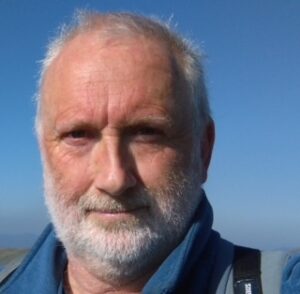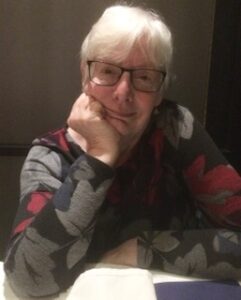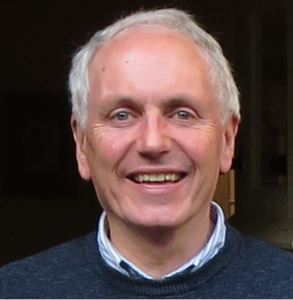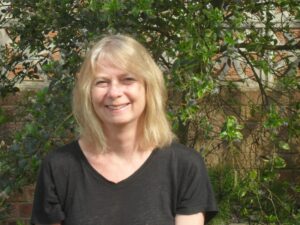We are proud to announce the results of the 2022 Cafe Writers Poetry Competition judged by Jennifer Wong
Poets and winning poems are followed by the judges report
First Prize goes to Jim Green
A Bird Flies into the Banqueting Hall
To say hello to Christmas
and goodbye to this old house
we started our ritual one more time
flattening thin white pancakes onto plates
swirling them with
hoi-sin
as if old monks in saffron
following with the sharp tip
of thick brushes the moment
already gone
and as an afterthought
spreading shreds of
spring onion cucumber
green across the moon
dark silhouette of reeds
and wind-blown bamboo
and landing
with no splash
torn chunks of duck
aromatic
crispy
flightless
then rolling up the moon
the fattest joints we ever made
sucking on shared umami moments
over and over
until the bird was gone
the furniture removed
Christmas could wait
and the room was empty again
 Jim Green has worked for many years in the field of mental health with local and national organisations including Mind, the BBC and the Open University. He has published a number of books on wellbeing and meditation, the most recent being Giving Up Without Giving Up: Meditation and Depressions (Bloomsbury, 2019). Jim, who lives in Norwich, has won several poetry prizes, including the BBC Proms Poetry Prize 2015 and the George Crabbe Memorial Prize 2017.
Jim Green has worked for many years in the field of mental health with local and national organisations including Mind, the BBC and the Open University. He has published a number of books on wellbeing and meditation, the most recent being Giving Up Without Giving Up: Meditation and Depressions (Bloomsbury, 2019). Jim, who lives in Norwich, has won several poetry prizes, including the BBC Proms Poetry Prize 2015 and the George Crabbe Memorial Prize 2017.Second Prize goes to Jean Grimsey
If you ask me about my daughter, this is what I see
She’s laughing with the joy
of a four-year-old
running wild on a windy beach.
It’s winter.
She’s well-wrapped against the cold,
corduroy trousers and a navy aran
I knitted for her,
and wellies of course.
No hat,
she’s going through a phase
of no hats.
Her cheeks are flushed red
from the cold, her eyes bright.
I call her name and she stops,
follows my finger pointing
to the seagulls circling.
 Jean Grimsey – came late to the poetry world after moving to Teignmouth in Devon and studying for an MA in Creative Writing at Plymouth University. She is involved in several writing groups in the area and is a strong supporter of Poetry Teignmouth and its annual festival. She also reads at local Open Mic events both on-line and in person. Her work has been published in Acumen and in anthologies including Play, Poetry Teignmouth’s Pzazz! and an anthology on addiction, Despite Knowing. She is in the process of putting together her first collection.
Jean Grimsey – came late to the poetry world after moving to Teignmouth in Devon and studying for an MA in Creative Writing at Plymouth University. She is involved in several writing groups in the area and is a strong supporter of Poetry Teignmouth and its annual festival. She also reads at local Open Mic events both on-line and in person. Her work has been published in Acumen and in anthologies including Play, Poetry Teignmouth’s Pzazz! and an anthology on addiction, Despite Knowing. She is in the process of putting together her first collection.
Third Prize goes to Peter Wallis
WHITEOUT
Snow wants to talk over everyone, wants to shine.
Snow is the guest at the party
who tops every story with one of her own.
If you’ve run ten kilometres, she’s run fifteen.
If you’ve climbed the ben,
she’s sat at the top for a fortnight
and avalanched down.
You could see her for miles.
In the garden, she keeps gentling around,
making snow tortoises of everything.
She chivvies crimped rooves
even garages, to try being bridesmaids.
No birdsong this morning. Snow is on the wing –
the great Snow migration.
Rain has been made to kick off his boots
and creep garden’s living room in soft white socks.
Snow is speaking lots of synonyms for “white”.
But Sssh,
Snow is making a blanket statement.
With her limited palette,
she’s painting a portrait of herself
detail by detail, dabbed into place,
covering colour with a likeness
of blank canvas
 Peter Wallis is a Hawthornden Fellow, and Submissions Editor for the U.K. charity “Poems in the Waiting Room”. He has won several prizes and has been shortlisted in the National Poetry Competition. He won publication of a pamphlet, Articles of Twinship, in the Bare Fiction Debut Poetry Collection Competition 2015. Half Other, his first full collection, is forthcoming from the Hippocrates Press.
Peter Wallis is a Hawthornden Fellow, and Submissions Editor for the U.K. charity “Poems in the Waiting Room”. He has won several prizes and has been shortlisted in the National Poetry Competition. He won publication of a pamphlet, Articles of Twinship, in the Bare Fiction Debut Poetry Collection Competition 2015. Half Other, his first full collection, is forthcoming from the Hippocrates Press.
The Norfolk Prize goes to Sue Burge
The trees are talking to themselves
sending messages about the sky
from canopy to root
flirting with sunlight
murmuring rain mantras
in all their dialects
the oaks swearing
at the cloudless sky
in flawless Anglo-Saxon
rough bark tattoos my calves
I have always been in love with silver birches
longing to fall into a Russian fairy-tale
feel snowflakes wet my eyelids
smell the pungent truth of wolves
today is brown and dry as late autumn
I crunch leaves underfoot
a child at play in August’s heat
a stumble of long roots
lichen dapples bark
like tarnished silver
a single note of birdsong
catches in high branches
 Sue Burge is a freelance creative writing tutor, mentor and editor based in North Norfolk, UK. Sue’s poems have been published in a wide range of journals and have also featured in themed anthologies on science fiction, modern Gothic, illness, Britishness, endangered birds, WWI and the ongoing pandemic. Her two poetry collections are: In the Kingdom of Shadows and Confetti Dancers (Live Canon), and her two chapbooks are: Lumière and The Saltwater Diaries (Hedgehog Poetry Press). She is currently working on her next full collection which explores the world of the alter ego she left behind in Paris three decades ago.
Sue Burge is a freelance creative writing tutor, mentor and editor based in North Norfolk, UK. Sue’s poems have been published in a wide range of journals and have also featured in themed anthologies on science fiction, modern Gothic, illness, Britishness, endangered birds, WWI and the ongoing pandemic. Her two poetry collections are: In the Kingdom of Shadows and Confetti Dancers (Live Canon), and her two chapbooks are: Lumière and The Saltwater Diaries (Hedgehog Poetry Press). She is currently working on her next full collection which explores the world of the alter ego she left behind in Paris three decades ago.
Commended
David Bleiman
Your Swedish Flat Pack Love Kit
for Rubén and Verónica, IKEA Alcorcón, Madrid, 2005
He waited in the dark
in a cold, hard box,
worked his way to the top of the pile,
couldn’t see a way to get it together,
though all the instructions were at hand.
She’d been looking for something suitable,
meandered the set path by the meatballs,
through a crush of Swedish consonants
until she found consonance,
taking him home in the boot.
Laid out on the bed in her flat,
his coat stripped off with a Stanley knife,
she counted his panels and pins,
dowels and glue, three sizes of screw
and set to with the Allen key.
She held him now, fully assembled,
sat down, resting her arms on his,
content in herself and supported
and he, at last, hers, hers completely
and only the best of himself.
They opened the next box together,
the parts were all there but this time,
while looking for the missing manual,
a flimsy sticker fell out, reading:
Lycka till med den här saken!
Note: Lycka till med den här saken–good luck with this thing
Commended
Marion Oxley
Hagstone
At first it was just one
an absent-minded slipping into the pocket
like that packet of McVitie’s Penguins.
Then a furtive find, a pocketed indulgence.
You started noticing curves, symmetry, weight,
the way light fell through holes like open mouths.
You started searching for what pleased you.
Barbara Hepworth type forms, small stone sculptures.
Sea-polished pieces of art you needed to have.
The house filled with rows of them, careful groupings
on windowsills, bookshelves, tops of picture frames
perfectly balanced. Holes that looked up at the ceiling,
out of the window, back at you. Unblinking,
non-judgmental holes, in a calm, pebble repose.
Sometimes you would pick one up.
Try to remember where it was found.
Hold its calm acceptance, its cold, smooth body
warming in your palm. Skin to stone.
Feel your heart pounding against the rock.
Some nights you’d have sea churning dreams,
on the edge of darkness, a maelstrom,
a Corryvreckan whirlpool of guilt drawing you in.
Hear books sliding off shelves, plates smashing on tiles,
pictures falling from walls. You’d feel the pull towards
a dark centre, the abyss, the hole, remember the light.
House swaying, rocking side to side, a seal glides by,
slides between the sheets. You feel the silky-smooth bulk
of a speckled body lying beside you. Hear a crackling,
rustling noise. For a moment you’re confused. Half-awake.
A mottled hand like a flipper appears holding a cup of tea,
offering you a Penguin.
Commended
Ilse Pedlar
My body is a map of all my journeys
knuckles of vertebrae keeping apart chevrons on every endless motorway,
breasts, tattooed with contours describing all the peaks I’ve ever climbed,
stomach, a sand- duned beach where oceans break saltily and offshore
reaching arms of wind turbines point lazily at me and me and me.
My body is a set of architect’s drawings; cross sections of foundations
in fine black lines, cutaways of walls, depths of insulation, sole
plates, air spaces and that south elevation – well thumbed; its outlines
of shrubs, an occasional well-placed tree, the picket fence.
My body is a bucket of all my self -deceptions; the one with the hole
in the bottom dear Liza, dear Liza, it is the only body that knows
this and some days chooses to hold up a mirror in which I am too
ashamed to look. My body is every fading silver line on my wrists.
My body is a collage of all the bodies; a cutting room floor
of snipped bits, a wastebin of Botox and collagen fillers
photoshopped to perfection, held hostage in every magazine,
on every screen, paid for with every teenage girl’s dream.
My body is a vessel with many openings; cored, pierced, gagged,
picked up and put down; my body is a record of all the hands upon it.
My body is space and no space, has been documented and deleted
My body has become unreliable, parts of me have disappeared
Commended
Stephen Allen
The rains return in Zambia
Across the vast miombo woods
We fix a stare and supplicate
To the electric heart that beats
In thunder-drums from westerly
As massing, flickering lantern clouds
Grow laden with the rain we crave
Teasing light-shows draw in closer
While children, cats and dogs lie languid
On our hopeful evening-stoep
In treacly end-of-dry-time air
Every creature deeply longing
For water’s atavistic care
In time,
A flash of image-freezing force
Brings a straight-down perfect teem
That transforms the spirit of the day
And presents the pure transcendent gift
Of running rain that allows all life
And for me,
To feel renewed and see again
My children dancing in the rain
Commended
Marion Hobday
Car Crash in Seven Movements
After Richard Siken
1
Let’s say you’re in a car. You don’t have to be driving. Let’s say there’s two people in the car, a man and a woman, we’ll call them Jack and Jean. Somewhere along the road there’s going to be an accident. You don’t have to think about that yet but you might want to get out of the car before it happens.
2
Jack and Jean aren’t thinking about it. Well, to be honest, Jack might be he certainly seems distracted, but Jean puts that down to pressure at work. So there you are driving along listening to some music, you can choose what, but not Coldplay.
3
Let’s say it’s autumn. Falling leaves, frost, a beautiful sunny day crisp as an iced biscuit. Driving along a country lane. Beat, beat, of music, flick, flick of sun through the trees, light, dark, light, dark, dark. They’re talking about what to buy the kids for Christmas. Only you know there’s something round the bend.
4
Here’s a game. Get down on the floor. Who can be first? That’s what Jean’s father said as they drove past an accident when she was a child. Two mangled cars and two mangled bodies leaking blood and brains into the petrol pooling on the road and another spread-eagled halfway through a smashed windscreen. Not that Jean saw. She was crouched on the floor with her brother behind the front seats, concentrating on not looking.
5
Other things Jean didn’t look at:- the fresh fish delivery man whose smile was like spinning through water, why there were no photographs of her sister’s wedding, and why, her grandfather who looked like Stalin, and could make cats laugh, was never left alone with her.
6
Jean is very good at not looking. She’s been not looking very hard lately, ever since the holiday last summer with their best friends in the South of France. Jack told her she was imagining things, but in the insect thick evenings she could hear the flicker of moths as they immolated themselves in the candles with a soft hiss. Standing on the broken bridge at Avignon she could smell burning.
7
She was not looking so hard her eyes stung when they went kayaking, she in the boat with the children, Jack and the other woman, her friend, somewhere ahead around the bend of the river. Or later swimming as the others held hands and jumped into the water she felt she was disappearing like an ice sculpture into the bubbling rapids that tore at her wedding ring.
Judges Report
It is my honour to be judging the Cafe Writers Competition this year, which has been met with such enthusiastic responses. The judging process reaffirms our belief in the power of poetry in capturing and giving shape to what may otherwise go unnoticed, and the way poetry can change our way of seeing, bring healing, bear witness and, most of all, bring new understanding towards the complexity and beauty of the world.
I am fascinated with the tree portraits in Sue Burge’s ’The trees are talking to themselves’— winner of the Norfolk Prize–in which trees imagined to be ‘flirting with sunlight / murmuring rain mantras / in all their dialects’. The skilful use of the form and voice combined with the sensitivity of language has offered us a poem full of life and spirit, and the poem ends with ‘a single note of birdsong / catches in high branches’, a stunning imagery making the invisible visible.
Here are a few things to share about the commendations, in no particular order:
Inspired by the emotional complexity in Richard Siken’s poetry, Marion Hobday’s ‘Car Crash in Seven Movements’ unravels the tension in a relationship as the couple drifts apart. The long lines such as ‘Jack told her she was imagining things, but in the insect thick evenings she could hear the flicker of moths as they immolated themselves in the candles with a soft hiss’ teases out the discrepancy viewpoints between the couple. The cleverly-juxtaposed flashbacks and points of view in the seven parts of the poem urge the reader to read between the lines, capturing the catastrophic, inevitable changes in a relationship and the inner turmoil of those involved.
At the heart of ‘Hagstone’ by Marion Oxley is the power of its hypnotic language, as we notice the liminal divide between the everyday and the uncanny: ‘Some nights you’d have sea churning dreams, /on the edge of darkness, a maelstrom, / a Corryvreckan whirlpool of guilt drawing you in.’ On the other hand, Stephen Allen’s ‘The rains return in Zambia’ is a heartwarming narrative poem of kindled community spirit, supplication and belonging, harbouring one’s sense of love for the land and hope for the new generation. Inspired by modern life and the hidden meanings of a foreign language, David Bleiman’s ‘Your Swedish Flat Pack Love Kit’ taps into the concept of furniture assembly with nuanced language and wit, as we revisit the joy and frustration of fitting furniture items together with the familiar ‘dowels and glue’, and recall the sense of triumph in being ‘content in herself and supported’ while what is to be created can be ‘only the best of himself.’ Thinking of the complexity of the body, Ilse Pedlar’s ‘My body is a map of all my journeys’ is a powerful poem teemed with such striking images and contours, mapping the body in light of one’s physical sensations, memories, longings and moments of humiliation, from it being ‘a set of architect’s drawings; cross sections of foundations / in fine black lines, cutaways of walls’ to ‘bucket of all my self -deceptions.’
As for the runners-up, Jean Grimsey’s ‘If you ask me about my daughter, this is what I see’ reveals a thoughtful balance between what’s visible and what remains unspoken in the mother-daughter relationship. There is much tenderness in the use of pared down poetic language. The ending of the poem suggests the inter-connected perception between the mother and the young daughter’s worlds, and how the poem suggests that both of them belong to the family of living things.
In Peter Wallis’s ‘Whiteout’, there is much to admire in the imaginative and precise use of images in the poem, how snow can become a metaphor for one’s love for life, for the power of imagination: ‘In the garden, she keeps gentling around, / making snow tortoises of everything.’ The playful language running throughout the poem demonstrates what poetry can do in transforming perception and experiences.
I chose Jim Green’s ‘A Bird Flies into the Banqueting Hall’ because it’s a poem that I couldn’t resist but reread several times. I find the narrative arc of this poem fascinating, as it blends the imagery of a festive ritual or dinner with the complex emotions of a separating couple. The house becomes an architecture where rituals, love, sadness are remembered and on the verge of disappearance. First inhabited, then emptied, the place is a point of return yet no return, where ‘Christmas could wait /and the room was empty again.’
I look forward to hearing the wonderful poets read from their work at the competition award event.